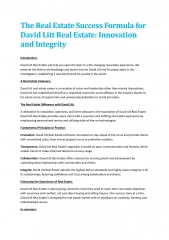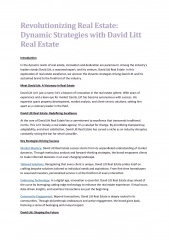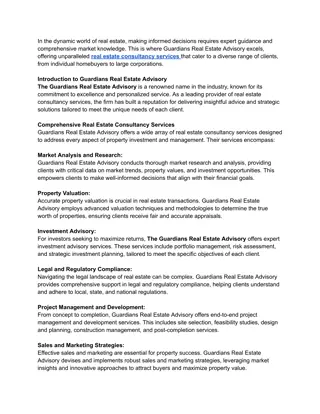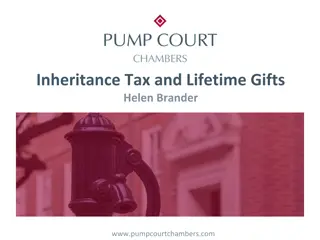
Challenge of Estate Planning in Uncertain Times with John M. Harpootian, Esq.
Explore the challenges and opportunities in estate planning amidst uncertain tax laws. Review the 2023 Greenbook proposals and understand the potential impact on estate planning strategies. Gain insights on capital gains, wealth taxes, trust modifications, and more presented by John M. Harpootian, Esq.
Download Presentation

Please find below an Image/Link to download the presentation.
The content on the website is provided AS IS for your information and personal use only. It may not be sold, licensed, or shared on other websites without obtaining consent from the author. If you encounter any issues during the download, it is possible that the publisher has removed the file from their server.
You are allowed to download the files provided on this website for personal or commercial use, subject to the condition that they are used lawfully. All files are the property of their respective owners.
The content on the website is provided AS IS for your information and personal use only. It may not be sold, licensed, or shared on other websites without obtaining consent from the author.
E N D
Presentation Transcript
The Challenge of Estate Planning in Uncertain Times Presented By: John M. Harpootian, Esq. 401-455-9800 John@PH-EstPlan.com
Introduction As professionals who counsel our clients on their wealth and taxes, certainty in the law is what gives us the most credibility. When asked what do you recommend? the last thing clients what to hear back is well, that depends Last year, we talked about the potential for dramatic changes in tax law that would affect our advice to clients with the election of Biden as President and with the Democrats in control of the House and the Senate. President Biden, in his 2022 proposals, laid out a complicated web of proposals that were matched by an equally complicated web of bills introduced the House and Senate, which raised income taxes, capital gains taxes, estate taxes, gift taxes and generation-skipping transfer taxes. None of those proposals passed in 2022, but you know what happens to old proposals they get reworked and proposed again!! On March 9, 2023, the Treasury released General Explanations of the Administration s Fiscal Year 2024 Revenue Proposals most commonly known as the Greenbook. Today, we will review the proposals, handicap the likelihood of passage, and outline some options as to how to plan now for what might happen.
2023 Greenbook Proposals There are 5 main portions of the Greenbook that affect estate planning. Capital Gains are treated as realized at death and upon a gift. A minimum tax on persons whose wealth exceeds $100 million. A Modification of the treatment of Grantor Retained Annuity Trusts ( GRATs ) and Intentionally Defective Grantor Trusts ( IDGTs ). Limiting the time that generation-skipping transfer tax exempt trust may run. New and improved tax administration for trusts and estates. Effective Date is January 1, 2024.
2023 Greenbook: What is NOT included? No reduction in the estate or gift tax exclusion; meaning that the $12,920,000 indexed is law through 12/31/25. The grantor trust status of Irrevocable Life Insurance Trusts ( ILIT ) is not included, thus the ILIT technique remains viable. The valuation of non-business assets in family held entities such as Family Limited Partnerships ( FLP ) is not deemed to be the value of the entity.
Deemed Realization of Capital Gains A transfer by gift or at death to any person other than a spouse or charity of any capital asset, other than household personal effects, (seemingly regardless of how long held) triggers a realization event of the entire gain. The Federal capital gains tax is proposed to be 39.6%. There is a unified exclusion of capital gains for both gifts and transfers at death of $5 million, meaning that if used during lifetime to shelter gifts, it is not available at death to shelter death time gains. The exclusion is portable between spouses the same way the unused estate tax exemption is available to be used by a surviving spouse. The net effect is that married taxpayers have $10 million of gain exclusion to utilize. The capital gains tax can be deferred when the gift is of a family owned and operated business in which case the tax is due upon the sale of the company. This election is a double-edged sword because the value of the business could go down as well as up!
Wealth Tax For taxpayers whose net worth is over $100 million, there is a proposed new minimum tax equal to 25% on all income and unrealized capital gains. The tax can be paid in installments over 9 years. Is this tax constitutional? See the 16thAmendment to the US Constitution added in 1913 when the federal income tax was first enacted.
Targeting GRATs an IDGTs The Administration views GRATs and IDGTs as abusive. This is despite the GRAT having been specifically legislatively created in 1990 in IRC Section 2702 (b)(1) and the IDGT essentially being facilitated by the kiddie tax under IRC Section 671. GRATS would be required to have: A minimum term of 10 years. A maximum term of the life expectancy of the annuitant plus 10 years. A ban on a declining annuity (so as to avoid a reduction in the amount includable in the estate of the grantor who dies before the term expires). A minimum remainder of 25% so as to eliminate the zeroed-out GRAT. A ban on the grantor re-acquiring the GRAT assets without recognizing gain or loss.
GRATs Almost always, we prefer short term, zeroed out GRATs to move the appreciation on a closely held business out of the taxable estate while still maintaining the base value for the grantor. This is not a new technique. We have been doing a form of GRATs for 40 years and Congress codified the rules more that 30 years ago. This is the time to encourage your clients to do GRATs. The stock market may be in a state of heavy volatility for some time to come, but some closely held businesses are doing well and GRATs are a way to preserve value for both the grantor s generation and create value for the grantor s children.
IDGT These did not exist before the kiddie tax was enacted in the 1980s as a result of Congress recognizing that wealthy taxpayers were shifting income to trusts for their low income children. Thus, Congress passed provisions to treat the grantor as the owner of certain trusts for income tax purposes. This effectively put an end to income shifting and gave birth to sales to grantor trusts. The Greenbook proposal would recognize gain on a transaction between a grantor and an IDGT, thereby eliminating the benefit of an IDGT sale which otherwise would have frozen the value of the assets sold to the IDGT by the grantor. Anyone thinking of a sale to an IDGT should do this now to lock in the old rules.
Limitations on GST Exempt Trusts 1. Multi-Generational Dynasty Trusts are the target. 2. Typically, wealthy people want their wealth to be in a Family Bank for as long as they have family living. By allocating GST exemption to gifts, life insurance premiums and deathtime transfers, we can make a dynastic trust escape estate tax for an unlimited number of generations. 3. The Greenbook proposals limit the GST exemption to just 2 generations below the grantor, meaning to children and grandchildren and NOT to great-grandchildren and beyond. 4. If enacted, this provision is retroactive, so there is nothing that can be done to plan for it.
New and Improved Tax Administration Special Use Valuation reduction for farms and ranches (currently $1.31 million) would be increased to $13 million. This is useful for farms that are in high value areas such as beachfront farms. All estates are subject to a 10 year lien for estate and gift tax due. This lien would be automatically extended if the taxpayer entered into any deferral or installment payment plan for the tax. All trusts valued at over $300,000, or gross income of over $10,000, would be required to file with the IRS an annual report stating the name of the grantor, the trustee, the TIN and an estimate of the value of the trust. WHY? All of this information is already reported on a 1041!
Charitable Lead Annuity Trust (CLAT) Proposal to require that annuity payments must be a level, fixed amount over the term of the CLAT. The value of the remainder interest must be at least 10% of the value of the assets used to fund the CLAT at the beginning. Idea here is to limit the reversion benefit to the grantor or the grantor s family at the end of the charitable lead term.
Will Any of This Become Law? This is anyone s guess, but here are the facts: The Republicans control the House by only 4 seats. If they lose 2 votes, the it is certainly possible for some of the proposals to pass. We got a hint of this last week when the debt ceiling proposals passed the House, but not with unanimous Republican support. The Democrats control the Senate by one seat. Thus, if 2 Democrats vote with the Republicans, nothing passes. There is a high likelihood that at least 2 Democrats will not vote for these proposals. The 2023 Greenbook is essentially a reworking of the Democrats wish list on estate and gift taxes of the last 30 years.
A Bipartisan Compromise, Perhaps? The motivation for a bipartisan compromise is possible due to the debt ceiling negotiations. A compromise MAY include: Keep the exemption where it is and increase the rates; perhaps graduated rates of 40%, 45%, 50%, 55%, 60% and 65%? Higher marginal rates raise the most revenue. Lowering the exemption raises next to no revenue relative to total expenditures. Restricting the effectiveness of GRATs. Eliminating valuation discounts for FLPs. Bringing back carryover basis again.
Estate Planning to Do Now Fund ILITs with cash to fund future premiums and allocate GST exemption. Set up a GRAT for closely held business interests. Explore an IDGT for the sale of appreciating assets for a promissory note to freeze value.
IRA Beneficiary Designations Under the SECURE Act The Setting Every Community Up for Retirement Enhancement Act was passed by Congress in 2019. It can best be described as a solution in search of a problem. On February 24, 2022, the Treasury issue proposed regulations on the SECURE Act which made matters worse. Here are the basics that all of us advisors need to know when advising clients with any qualified plan assets: There are 3 types of beneficiaries of qualified plans. Eligible Designated Beneficiary. Qualified Designated Beneficiary. No Designated Beneficiary.
Beneficiary Designations The spouse of the participant is able to do a rollover IRA and take RMDs over his/her lifetime. A spouse is an Eligible Beneficiary. A Qualified Beneficiary is a person who is not a spouse or a person under age 21. If the participant died BEFORE attaining the age of RMDs (70.5 or 72), then the beneficiaries must take all distributions within 10 years. If AFTER, then distributions are made over the life expectancy of the beneficiary, but ALL distributions must be made within 10 years. Where there is no Qualified Beneficiary (payable to the Estate) and death is BEFORE RMDs, then the estate must take distributions within 5 years. If AFTER, then within 10 years. These same rules apply to conduit trusts for the benefit of Eligible and Qualified Beneficiaries.
What About a QTIP? A Qualified Terminable Interest Property Trust can be the Eligible Beneficiary of a qualified plan on a strict conduit basis for the benefit of a surviving spouse. The Qualified Plan will qualify for the marital deduction against the estate tax. The decedent s children can be the remainder beneficiaries of the QTIP as Qualified Beneficiaries subject to the 10-year rule.
And What About Grandchildren? Grandparents that want to make their grandchildren the beneficiary of their qualified plans should seriously consider doing a Roth conversion first so that the 10-year RMD will not apply to withdrawals by the grandchildren.
SECURE 2.0 On December 29, 2022, President Biden signed the Consolidated Appropriations Act of 2023 which contained the SECURE 2.0 Act of 2022. It changes the RMD rules again. Age 73 is the beginning date for those who turn 72 in 2023 or later. For those who turn 74 in 2033 or later RMDs must begin at age 75. Permits gifts to charity from an IRA to Charitable Remainder Trust or Charitable Gift Annuity.
The Challenge of Estate Planning in Uncertain Times John M. Harpootian, Esq. 401-455-9800 John@PH-EstPlan.com






















